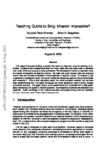Teaching Qubits to Sing: Mission Impossible?
| dc.contributor.author | Miranda, E | |
| dc.contributor.author | Siegelwax, BN | |
| dc.date.accessioned | 2022-09-18T13:18:22Z | |
| dc.date.issued | 2022-09-16 | |
| dc.identifier.issn | 1548-7199 | |
| dc.identifier.issn | 1548-7202 | |
| dc.identifier.uri | http://hdl.handle.net/10026.1/19633 | |
| dc.description.abstract |
This paper introduces QuSing, a system that learns to sing new tunes by listening to examples. QuSing extracts sequencing rules from input music and uses these rules to generate new tunes, which are sung by a vocal synthesiser. We developed a method to represent rules for musical composition as quantum circuits. We claim that such musical rules are quantum native: they are naturally encodable in the amplitudes of quantum states. To evaluate a rule to generate a subsequent event, the system builds the respective quantum circuit dynamically and measures it. After a brief discussion about the vocal synthesis methods that we have been experimenting with, the paper introduces our novel generative music method through a practical example. The paper shows some experiments and concludes with a discussion about harnessing the system’s creative potential. Accompanying materials are available in an Appendix. Audio recordings of the musical examples and programming code are available: https://github.com/iccmr-quantum/QuSing. | |
| dc.format.extent | 303-331 | |
| dc.language | English | |
| dc.language.iso | English | |
| dc.publisher | Old City Publishing | |
| dc.rights | Attribution-NonCommercial-NoDerivatives 4.0 International | |
| dc.rights.uri | http://creativecommons.org/licenses/by-nc-nd/4.0/ | |
| dc.subject | Computer music | |
| dc.subject | music technology | |
| dc.subject | quantum computing | |
| dc.subject | vocal synthesis | |
| dc.title | Teaching Qubits to Sing: Mission Impossible? | |
| dc.type | journal-article | |
| dc.type | Journal Article | |
| plymouth.author-url | https://www.plymouth.ac.uk/staff/eduardo-miranda | |
| plymouth.issue | 4 | |
| plymouth.volume | 17 | |
| plymouth.publisher-url | https://www.oldcitypublishing.com/journals/ijuc-home/ijuc-issue-contents/ijuc-volume-17-number-4-2022/ijuc-17-4-p-303-331/ | |
| plymouth.publication-status | Published | |
| plymouth.journal | International Journal of Unconventional Computing | |
| plymouth.organisational-group | /Plymouth | |
| plymouth.organisational-group | /Plymouth/Faculty of Arts, Humanities and Business | |
| plymouth.organisational-group | /Plymouth/Faculty of Arts, Humanities and Business/School of Society and Culture | |
| plymouth.organisational-group | /Plymouth/REF 2021 Researchers by UoA | |
| plymouth.organisational-group | /Plymouth/REF 2021 Researchers by UoA/UoA33 Music, Drama, Dance, Performing Arts, Film and Screen Studies | |
| plymouth.organisational-group | /Plymouth/Users by role | |
| plymouth.organisational-group | /Plymouth/Users by role/Academics | |
| dcterms.dateAccepted | 2022-07-27 | |
| dc.rights.embargodate | 2022-9-22 | |
| dc.identifier.eissn | 1548-7202 | |
| dc.rights.embargoperiod | Not known | |
| rioxxterms.licenseref.uri | http://creativecommons.org/licenses/by-nc-nd/4.0/ | |
| rioxxterms.licenseref.startdate | 2022-09-16 | |
| rioxxterms.type | Journal Article/Review |



